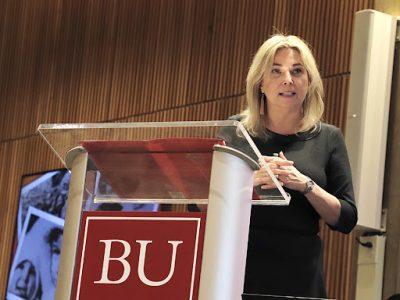Constantly wearing a huge smile on her face, Monika Ille exudes positivity and joy in photos, on stages and even through Zoom.

This wildly enthusiastic, blonde-haired woman regularly advocates for a serious cause — storytelling by Indigenous people about themselves, specifically Canadian Indigenous peoples, based on her own Abenaki heritage.
Ille spoke at Boston University’s Howard Thurman Center for Common Ground Wednesday as part of BU Arts Initiative Indigenous Voices in the Americas series. She explained her role in the Aboriginal Peoples Television Network and how she works to empower the Canadian Indigenous community to engage in this narrative sovereignty.
“I always wanted to share stories,” Ille, a broadcast industry professional with almost 30 years of experience, said. “I saw the impact, and when I saw this opportunity to work for APTN and be able to lead and control our [Indigenous] own stories … I couldn’t say no to something like that.”
Being raised mainly by her mother and grandmother, Ille said she felt more connected to her mother’s Abenaki side than her father’s Hungarian roots. She has become an advocate for the Abenaki First Nations in Alberta, Canada.
Abenaki are indigenous peoples from the Northeastern Woodlands of Canada and the United States.
For the past 18 years, Ille has pursued television with an emphasis on Indigenous programming at APTN, the first national Indigenous broadcaster in the world. She began as the Quebec liaison officer in 2003 and moved into the programming department, eventually being appointed CEO in 2019.
With APTN, Ille said she was able to give opportunities to Indigenous creators and take back the Indigenous narrative historically told by those in power.
“Understanding the importance of narrative sovereignty is key to understanding the worldview of Indigenous communities as storytellers,” Ille said at the event. “After years of cultural genocide, cultural repression, cultural appropriation and misrepresentation, Indigenous people strive for narrative sovereignty … Indigenous peoples, we are taking the lead, but we still have a long way to go.”
Ille spoke about how residential schools forced thousands of Indigenous children to leave their families and be indoctrinated into mainstream white Canadian society.
In the 20th century, thousands of students were physically and sexually abused, and thousands more of unmarked graves were found at the Kamloops Indian Residential School, the largest of its kind, Ille said.
APTN News covered these injustices, giving more context to these Indigenous issues from the Indigenous perspective than mainstream media like CTV Television Network can.
At APTN, Ille was a core voice in greenlighting “Mohawk Girls,” a comedy-drama about four Indigenous women trying to find love. She was able to support filmmaker Tracey Deer’s vision and the show ran for five seasons.
Ille said APTN plays a major role in supporting the Indigenous media community with approximately 60% of its employees being Indigenous. It also broadcasts in 16 Indigenous languages across 10 million Canadian homes.
“Indigenous media shatters stereotypes,” Ille said. “APTN’s primary audience is Indigenous peoples. However, our content is for all to appreciate the diverse storytelling that these Indigenous creators have to say.”
Nearly 50 people attended the event, ranging from BU students to community members to friends. Ille fielded questions and stayed behind to speak with audience members, encouraging them to look into Indigenous resources and issues.
Ille was invited to speak at the BU Arts Initiative Indigenous Voices in the Americas series by longtime friend and College of General Studies Master Lecturer, Regina Hansen.
“She’s [been] a friend for a number of years actually since we were teenagers,” said Hansen. “I was just so proud of her because when you’re in Canada, APTN is visible and it is on the cable. If you turn on the cable and flip through the cable, you’re gonna see it.”
Inspiring, accomplished and kind, Ille’s character and dedication to her community can be observed by friends and strangers alike.
Isabelle Weaver, a sophomore in Sargent College of Health and Rehabilitation Sciences, attended the talk for a class assignment but said she related to Ille’s mixed-race background.
“It really touched me because I’m Asian but I don’t look Asian and a lot of people brush me off,” Weaver said. “It was just really interesting to hear how she took her narrative back instead of giving it to other people. I thought that was just really inspiring, and it made me want to share my story the same way she shared hers.”


























































































































